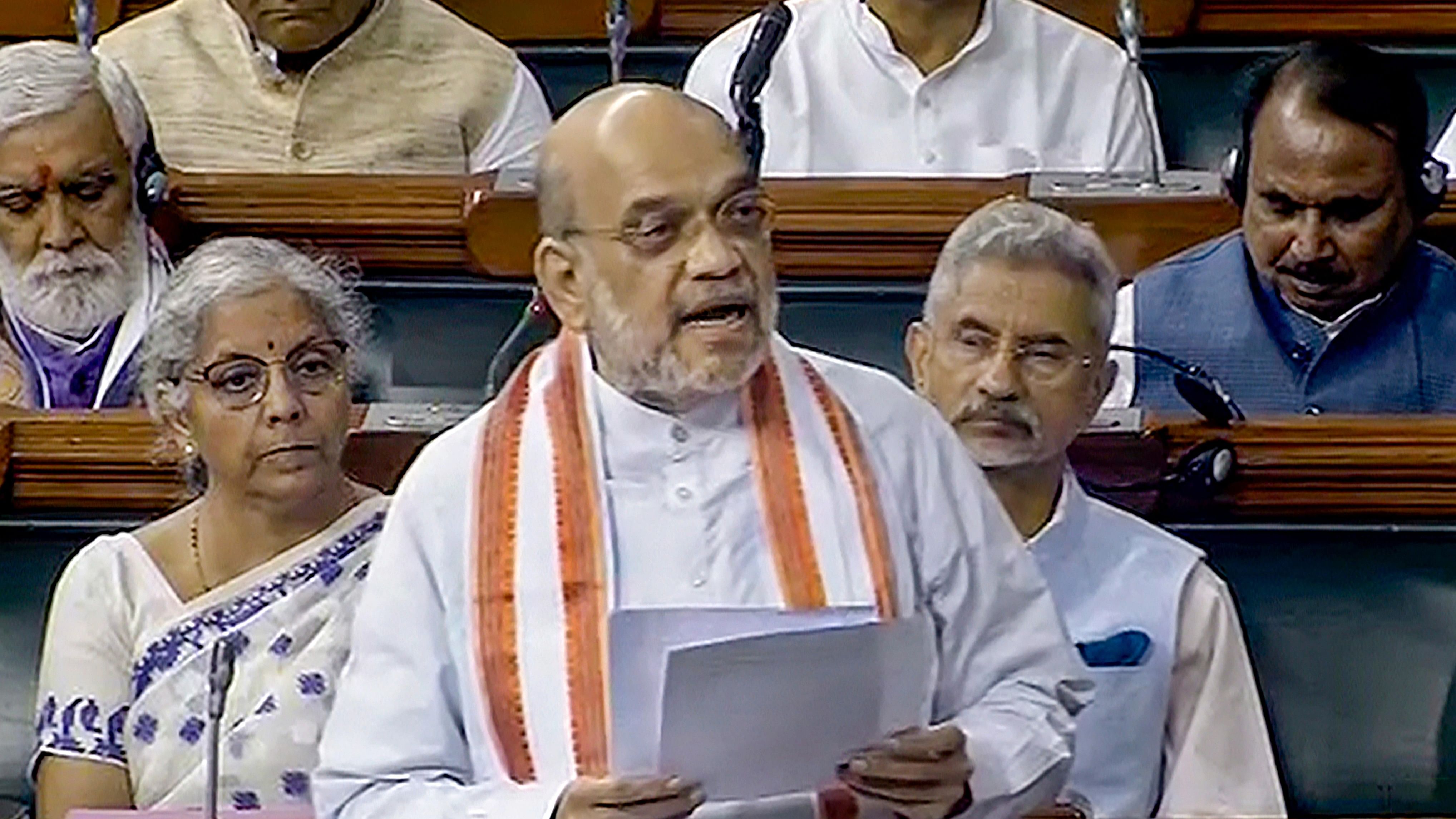
Home Minister Amit Shah in Lok Sabha.
Credit: PTI Photo
Repealing sedition, death for mob lynching, community service as punishment for petty offences, using electronic and digital record as evidence and summons through electronic mode form part of three new Bills introduced in Lok Sabha on Friday, as the Narendra Modi government intends to replace colonial era laws.
Union Home Minister Amit Shah tabled three Bills to repeal the 163-year-old Indian Penal Code, 126-year-old Criminal Procedure Code and 151-year-old Indian Evidence Act, which he said would free the laws from its "British hangover" and make it more “people-centric” by bringing the spirit to protect the rights of the Indian citizen at the centre stage.
The Bharatiya Nyaya Sanhita Bill, 2023 will replace the IPC, while Bharatiya Nagarik Suraksha Sanhita Bill, 2023 will make way for the CrPC and Bharatiya Sakshya Bill, 2023 for the Indian Evidence Act.
"I can assure the House that these Bills will transform our criminal justice system. The aim will not be to punish, it will be to provide justice. Punishment will be given to create a sentiment of stopping crime," Shah said, adding the Britishers framed laws, which had signs of slavery aimed at punishing those opposed to their rule.
As he suggested that the Bills be sent to a Parliamentary Standing Committee for scrutiny, he said the offences against women and children, murder and offences against the State have been given precedence.
The Bharatiya Nyaya Sanhita Bill, which would repeal the IPC, proposes to completely omit the contentious provisions of sedition but has retained the death penalty.
At the same time, it has listed new offences such as acts of secession, armed rebellion, subversive activities, separatist activities or endangering the sovereignty or unity and integrity of India, which attracts a jail term extending up to life. The new penal code also defines terrorist acts.
In cases like theft of valuables less than Rs 5,000, causing annoyance to the public in an intoxicated condition and defaming the President and those holding Constitutional positions, the offender could be punished by asking him to do community service.
For the first time, the proposed penal code has defined the punishment for mob lynching where the maximum punishment is death. The mob could escape death or life imprisonment but may have to undergo a minimum of seven years in jail, if convicted.
The offences against women and children, murder and offences against the State have been given precedence. The various offences have been made gender neutral, the Statement of Objects and Reasons of the Bill said.
The Bill clearly defines rape and the concept of consent but marital rape is not mentioned in the Bill. One could face minimum of 20 years in jail and a maximum of death penalty if a 12-year-old is raped. Convicts in cases of rape of girls below 16 years may get a minimum of 20 years.
The proposed penal code also defines organised crimes and petty organised crimes. Organised crimes is defined as any “continuing unlawful activity” including kidnapping, robbery, vehicle theft, extortion, land grabbing, contract killing, economic offences, cyber-crimes having severe consequences, trafficking among others by a group of individuals using violence or threat.
Similarly petty organised crime is defined as any crime that causes general feelings of insecurity among citizens relating to theft of vehicle or theft from vehicle, domestic and business theft, trick theft, cargo crime, theft, organised pick-pocketing, snatching, theft through shoplifting or card skimming and ATM thefts by an organised group.
The Bharatiya Nagarik Suraksha Sanhita Bill provides for trial and judgement of those who are absconding. It also provides for the use of technology and forensic sciences in the investigation of crime and furnishing and lodging of information, service of summons, etc., through electronic communication.
“Specific time-lines have been prescribed for time bound investigation, trial and pronouncement of judgements. Citizen centric approach has been adopted for the supply of a copy of first information report to the victim and to inform them about the progress of investigation, including by digital means,” according to the Bill.
“In cases where the punishment is seven years or more, the victim shall be given an opportunity of being heard before withdrawal of the case by the Government. Summary trial has been made mandatory for petty and less serious cases. The accused persons may be examined through electronic means, like video conferencing,” it said.
The Bharatiya Sakshya Bill provides for admissibility of an electronic or digital record as evidence and it shall have the same legal effect, validity and enforceability as paper record.
